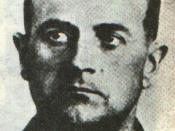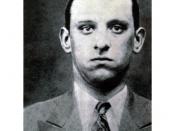Gracie Martinez
Tuesday, August 26, 2014
The Sunflower
"Forgiveness is not always about yourself, but what you can do for others, Gracie," My mother countlessly reminded me growing up. Simon Wiesenthal receives an opportunity to give a young German man, Karl, peace with his past before death however the lingering choice did not give him contentment. Wiesenthal asks the opinions of others because he was unsure if he made the correct decision, yet if it were the right choice he would not have felt unsatisfied. If Simon Wiesenthal would've made the correct choice of forgiveness, the remainder of book one could possibly be written about the control, peace and humility he received. While Wiesenthal's dear friend Josek, believed it wasn't Simon's place to forgive Karl, I would disagree. I find that forgiveness holds much greater value than choosing to not forgive.
When Simon remarks "The question of Germany's guilt may never be settled," it is clear that Simon has still not forgiven Germans for the actions of the Nazi soldiers.
By exclaiming to Karl's mother, "No German can shrug off the responsibility. Even if he has no personal guilt, he must share the shame of it," he clarifies to her his held grudge on all Germans. If Simon ever hopes of having the control to move on from his past he must forgive. Forgiving will not make him weak, nor does it mean that justice must go unserved. Just as how his decision to not forgive Karl remained with him, he had no control to move forward from it.
Along with having control to move on comes the privilege of peace. Simon was unable to make peace with his past incident with Karl. Contemplating on what the right decision was, he is incapable of achieving peace for it. Not...


